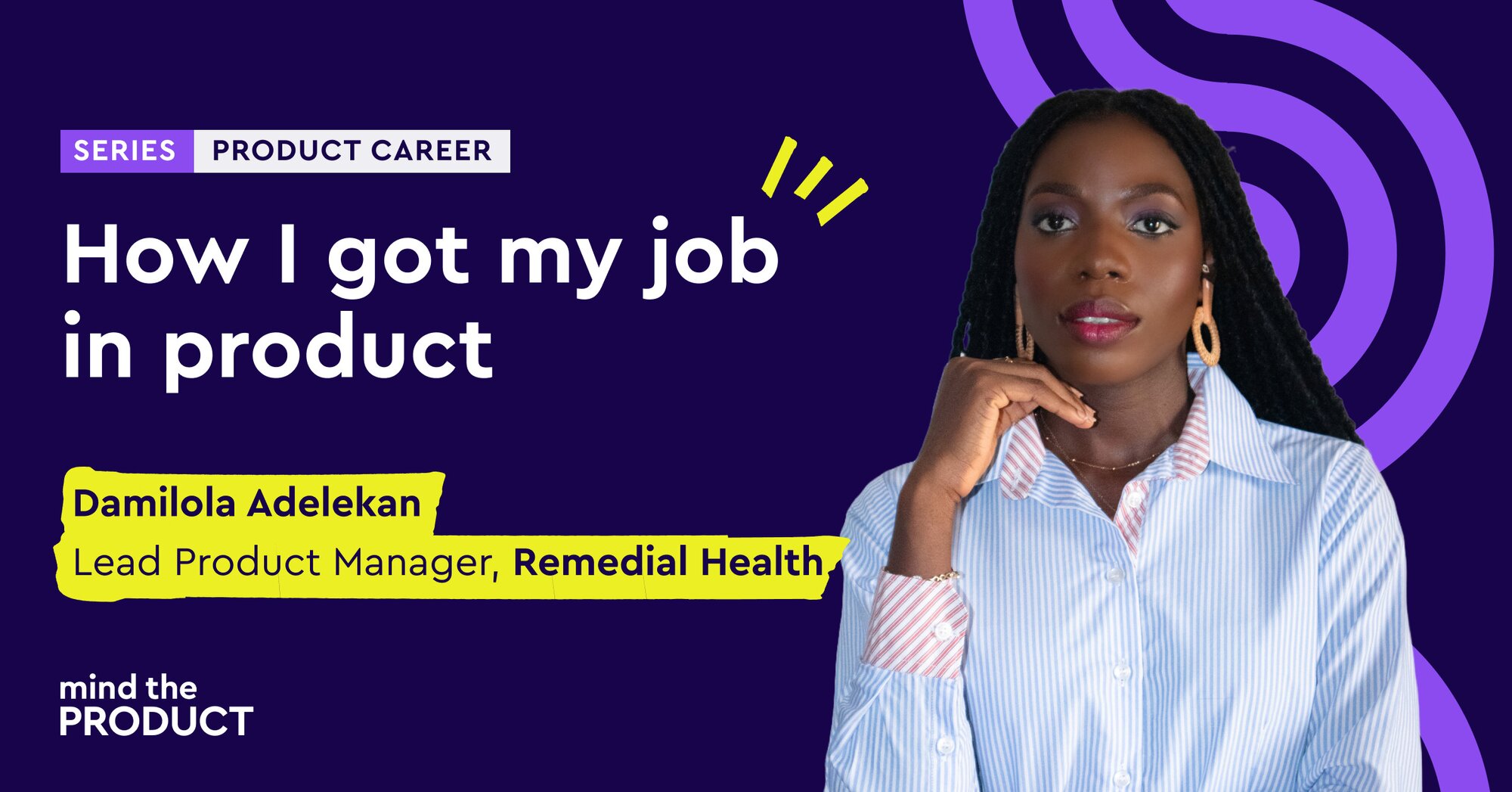Climbing the Product Career Ladder: Teresa Huang on progressing from Associate PM to VP and above

Teresa Huang is a Head of Product at healthcare company Bupa, overseeing more than 100 people across platform and quality teams. We spoke with her about progressing through each stage of the product career ladder, how PMs can build leadership skills, and more.
Can you share a background on your journey into product management?
I studied a double degree in Sydney, Australia, a Bachelor of IT and a Bachelor of Business, majoring in marketing and IT management. I always wanted to be in tech, but in a role that was creative.
I moved to Melbourne, worked in media, and then returned to the bank in the innovation lab. That was all about innovation. I really loved doing product management work during the early years. I thought, how do I build that opportunity, how do I get seen, and how do I practise?
I joined a start-up on the side with a friend. We stayed in there part time for six years. It was a peer-to-peer online cash currency converter. Through that, I learned how to work with engineers about building a product, tried to do product-market fit, pitched to VCs, launched marketing into Singapore, had a lot of customers, and had a lot going on. It was amazing. For me, it was the heart of product experience.
When I launched it and I told my boss at work, she said, “Why don’t you just become one here too? You seem so hungry, and you’re going out there trying to really understand the craft of product.” That was my first entry into a product role in an organisation. From then on, I climbed from product manager, senior product manager, director, and now head of product, managing over a hundred people within platform teams and quality teams.
What makes a great product manager in healthcare technology?
First, it’s getting deep into the problem. When you start as a product manager, people will tell you what problems they think it is. What I realised is that it’s all based on assumptions of what they know. But really validate that for yourself by talking to stakeholders and customers, looking at data, collecting quantitative and qualitative data together, and really coming to a point of view to ask yourself if that is the real problem.
Second, having a high sense of agency and urgency. No one’s going to give you everything that you need to support. No one’s going to just hand over data in the perfect form. You need to go and understand the gap, and then go off and grab what you need. Find partners across the organisation, stakeholders, and really understand what information they have and piece it all together for yourself.
For my team, our focus in how we get things shipped into market. The best confidence you’re gonna get is when it does get shipped. Read our article on how to turn messy data into effective product decisions.
And third, internal feedback. Asking for feedback throughout your entire process is important. Through feedback is where you’ll learn what your gaps are. You could be feeling like you’re nailing it, but then there could be some more senior product managers saying, “I think you should learn a little bit about this,” or, “Your communication could be a lot stronger.” Don’t take it personally. If you really care about your career growth, asking for feedback is the number one thing you should keep doing, and ask for examples so you know what to watch out for next time.
How long does it take to get promoted at each stage of the product career ladder?
I’ve seen people move from associate product manager to product manager within a year. It depends on their entry. If they're coming from a Business Analyst background, it can be a quick process because they’re in the squad. If someone transitions into product from marketing, it might take longer because they may need more time with the engineers.
If it’s an engineer, it’s also very easy because they’re in the squad. Anyone doing a side step in the squad should be able to get from Associate to PM in about 12 months.
Outside the arena, like data or marketing, the biggest thing I hear is, “I’ve never worked with an engineer, how do I land a job in product?” Engineers are different; they have different techniques or ways of communicating, and some people get put off because they think they’re not technical. You don’t need to be, because you have engineers. What they need from you is the purpose, the problem, and the value of doing it. Read our guide on finding your way in product management without a technical background.
It should take around three years to go from PM to senior.
There's maturity needed. As a PM, try to find opportunities to coach juniors. That’s your way of starting to build people management skills. It’s so different to see someone doing it versus actually being accountable.
In a large organisation, moving from senior PM to Director or Head of level can take five to six years, especially if you’re perfecting the people side and the strategy. In smaller companies, people sometimes get those titles faster, but in bigger organisations, you need solid foundations, or the pyramid falls apart.
What should you do if your promotion in product management isn’t coming?
For someone who really wants a promotion and wants to climb the career ladder, control sometimes isn’t in their hands. The organisation can only give you so much because of what they need to grow their business. Don’t take it personally; it’s just how business runs.
If you really care about getting promoted, there are other ways. One is looking outside, or you could take on more projects. But remember, it’s 50% you and 50% business needs. If you want it, you might have to step outside, go through the hard interviews, and do the case studies.
How can product managers build leadership skills at every level?
Leadership is everyone’s problem from day one. Even as an associate, teams looks to you to tell them where we need to go and why. You’re leading without being conscious of it.
It starts early. You move your team around; you have to be the motivator. The three-legged stool of tech lead, product manager, and designer, we are all leaders, and we have to lead by example.
You can also coach and mentor people, even outside of product. I coach marketing, product marketing, business analysts, and delivery. You learn a lot faster about how to coach someone in the craft. If you enjoy it and you’re successful, you’re ready to step up. If you don’t enjoy it, that’s fine. You can remain an IC, and ICs can go all the way up to principal, too.
How do you handle common issues like burnout and imposter syndrome?
I have experienced both. What helps me now is focusing on less effort, more impact. I lean on strategy and let my team execute rather than trying to carry everything myself. I also watch for my own signals. If I feel run down, I rest, because the business will continue without me. On a practical level, I try to exercise three times a week for 20 minutes, prioritise sleep, and keep weekends for family.
What should the first 90 days as a Product Manager look like?
- The first 30 days are about getting to know as many people in the organisation, especially on your team, as possible. Just have conversations. I asked three questions: What’s working well, what are some of the challenges, and how do I support you in your role? You’re really building relationships.
- The second 30 days are about reviewing all the things you’ve seen, understanding portfolios and practices.
- The last 30 days are about shaping your view of the world and the gaps you need to address across the four Ps (portfolio, people, practice, process).
Listen to this podcast episode on your first 90 days in product here.
What career advice would you give your younger self?
One thing that I would definitely do differently is to always push it into the customer’s hands, no matter how rough it is. There’s a sense of “oh my gosh, it’s wrong,” that's imposter syndrome, but customers don’t care. They want to experience half-baked things; they want to co-create. It’s valuable to push things out and ask for real feedback. People find value in the creation process, not just the end product. If they feel like their feedback shaped something, they feel good.
Also, I’d start my YouTube channel earlier.
Check out Teresa’s product channel here. She publishes some great content on leadership, excelling in your career, and platform product management.
About the author

Louron Pratt
Louron serves as the Editor at Mind the Product, bringing nearly a decade of experience in editorial positions across business and technology publications. For any editorial inquiries, you can connect with him on LinkedIn or Twitter.







